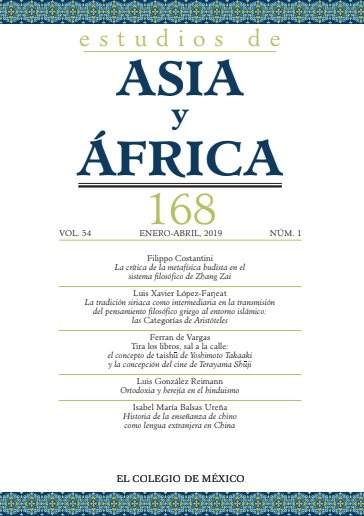Abstract
A knowledge of an ideology’s artistic aspect facilitates the understanding of its theory, and vice versa. This article makes a com-parative analysis of the film-making of Terayama Shūji, specifically Sho o suteyo machi e deyō [Throw away your books, rally in the streets], and Yoshimoto Takaaki’s theory of taishū, both as components of the Japanese New Left’s ideology of the late 1960s and early 1970s. Specifically, I focus on the parallels between Terayama’s films and Yoshimoto’s theory in their view of the relationship between the intellectual and the masses. I develop this comparative analysis on the basis that, even though both Yoshimoto and Terayama criticize ideology, their proposals contain a strong political component.References
Ando, T. (2014). Japan's New Left movements. Nueva York: Routledge.
Cassegard, C. (2008). From withdrawal to resistance. The rhetoric of exit in Yoshimoto Takaaki and Karatani Kojin. The Asia-Pacific Affairs, 6(3).
Centeno, M. (2012). Who can say that we not live like dogs? Retrospectiva de Shuji Terayama. Contrapicado. Escritos sobre cine. Recuperado de www.contrapicado.net.
Eagleton, T. (1991). Ideology. An introduction. Londres & Nueva York: Verso.
Fukuyama, F. (1992). The end of history and the last man. Nueva York: Free Press.
Furuhata, Y. (2013). Cinema of actuality. Japanese avant-garde filmaking in the season of image politics. Durham & Londres: Duke University Press.
Kelman, P. G. (2001). Protesting the national identity: the cultures of protest in 1960s Japan. (Tesis doctoral). University of Sidney, Sidney.
Kersten, R. (2009). The intellectual culture of postwar Japan and the 1968-1969 University of Tokyo struggles: Repositioning the self in postwar thought. Social Science Japan Journal, 12(2), 227-245.
Sakuta, K. (1978). The controversy over community and Autonomy. En J. V. Koschmann (Ed.), Authority and the individual in Japan. Citizen protest in historical perspective (pp. 220-249). Tokio: University of Tokyo Press.
Laclau, E. (1977). Politics and ideology in Marxist theory. Londres: NLB.
Morita, N. (2006). Avant-garde, pastiche, and media crossing: Films of Terayama Shūji. Waseda Global Forum, 3, 53-58.
Murakami, F. (2005). Postmodern, feminist and postcolonial currents in contemporary Japanese culture. A reading of Murakami Haruki, Yoshimoto Banana, Yoshimoto Takaaki and Karatani Kojin. Londres & Nueva York: Routledge.
Noonan, P. J. (2012). “Our dissolution”: Subjectivity, collectivity, and the politics of form in 1960s Japan. (Tesis doctoral). University of California, Berkeley.
Oguma, E. (2002). Minshu to aikoku (Pueblo y patriotismo). Tokio: Shinyosha.
Ridgely, S . C. (2011). Japanese counterculture. The antiestablishment art of Terayama Shūji. Minneapolis: University of Minnesota Press.
Sorgenfrei, C. F. (2005). Unspeakable acts: The avant-aarde theatre of Terayama Shūji and postwar Japan. Honolulu: University of Hawai’i Press.
Standish, I. (2011). Politics, porn and protest. Japanese avant-aarde cinema in the 1960s and 1970s. Nueva York: The Continuum International Publishing Group.
Yang, M. (2005). Yoshimoto Taka’aki, communal illusion, and the Japanese New Left. (Tesis de maestría). University of Toledo, Toledo.
_______. (2008). Yoshimoto Taka’aki’s Karl Marx: Translation and commentary. (Tesis doctoral). University of Toledo, Toledo.
Žižek, S. (1994). Mapping ideology. Londres & Nueva York: Verso.
This work is licensed under a Creative Commons Attribution-NonCommercial-NoDerivatives 4.0 International License
Copyright 2022 Estudios de Asia y África


